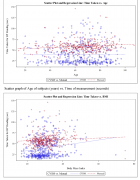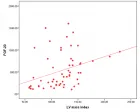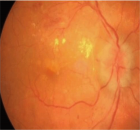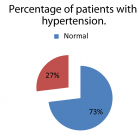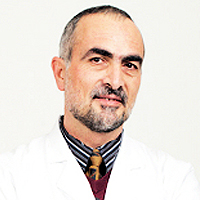Abstract
Case Series
Clinical profile, prognosis and post COVID-19 Illnesses among attendants to private general practitioner (GP) clinic at Urban Amman Area: a clinical case-series study
Esraa Abuzayed* and Ishtaiwi Abuzayed
Published: 04 March, 2023 | Volume 4 - Issue 1 | Pages: 019-022
Background: The clinical manifestations of Corona Virus Disease of 2019 (COVID-19) varied from patient to patient with evidence of multi-organ involvement. Many patients continue to have a wide range of symptoms for variable periods of time. The long-term effects of COVID-19 infection (post-COVID-19 illness or syndrome) are not yet been fully explored.
This study aims to highlight the clinical manifestations of the acute COVID-19 infection and the longer-term manifestations of the disease among the attendants to a private GP clinic in the Urban Amman Area, Jordan.
Methods: A clinical case-series study was conducted on a sample of 300 COVID-19-positive cases among patients attending my private GP clinic in the Urban Amman Area, Jordan. We used the structured questionnaire based mainly on World Health Organization (WHO) Case Report Form (CRF) verified tool for post-COVID-19. All patients with COVID-19 were included in the study. Data collection was conducted through phone calls and analyzed using the Statistical Package for Social Sciences (SPSS) software.
Results: The incidence of COVID-19 among patients attending the clinic during the period of this study was 25%. Females were 135 (45%) of the study population and males were 165 (55%). The mean (SD) of age was 34.2 (5.0) years. Most of the infected staff (90%) were symptomatic and developed acute COVID-19 symptoms. Fever, Cough, Fatigue, joint pain and loss of smell and taste were the most common symptoms. 72% of the study population had fully recovered from the infection, while 28% of them continued to suffer from many long symptoms. Fatigue (28%), shortness of breath on activity (18%), Social withdrawal (18%), anxiety (17%), forgetfulness (16%), trouble concentrating (15) and depressed mood (14%) were the most frequently reported long symptoms.
Conclusion: The prevalence of Post COVID-19 illness was 28% with a high public health burden calling for the public health system to address the medical and psychological needs of affected persons. Mental health and psychosocial support are recommended elements for the management of patients.
Read Full Article HTML DOI: 10.29328/journal.jcmhs.1001029 Cite this Article Read Full Article PDF
References
- Rashedi J, Mahdavi Poor B, Asgharzadeh V, Pourostadi M, Samadi Kafil H, Vegari A, Tayebi-Khosroshahi H, Asgharzadeh M. Risk Factors for COVID-19. Infez Med. 2020 Dec 1;28(4):469-474. PMID: 33257620.
- Khan M, Khan ST. Epidemiology and Progress So Far. Moléculas. 2021; 26 (1):1–25.
- Thakur V, Ratho RK, Kumar P, Bhatia SK, Bora I, Mohi GK, Saxena SK, Devi M, Yadav D, Mehariya S. Multi-Organ Involvement in COVID-19: Beyond Pulmonary Manifestations. J Clin Med. 2021 Jan 24;10(3):446. doi: 10.3390/jcm10030446. PMID: 33498861; PMCID: PMC7866189.
- Yelin D, Margalit I, Yahav D, Runold M, Bruchfeld J. Long COVID-19-it's not over until? Clin Microbiol Infect. 2021 Apr;27(4):506-508. doi: 10.1016/j.cmi.2020.12.001. Epub 2020 Dec 11. PMID: 33316400; PMCID: PMC7832095.
- World Health Organization. A clinical case definition of post COVID-19 condition by a Delphi consensus, 6 October 2021. Accessed June 21, 2022. https://www.who.int/publications-detail-redirect/WHO-2019-nCoV-Post_COVID-19_condition-Clinical_case_definition-2021.1.
- O'Mahoney LL, Routen A, Gillies C, Ekezie W, Welford A, Zhang A, Karamchandani U, Simms-Williams N, Cassambai S, Ardavani A, Wilkinson TJ, Hawthorne G, Curtis F, Kingsnorth AP, Almaqhawi A, Ward T, Ayoubkhani D, Banerjee A, Calvert M, Shafran R, Stephenson T, Sterne J, Ward H, Evans RA, Zaccardi F, Wright S, Khunti K. The prevalence and long-term health effects of Long Covid among hospitalised and non-hospitalised populations: A systematic review and meta-analysis. EClinicalMedicine. 2022 Dec 1;55:101762. doi: 10.1016/j.eclinm.2022.101762. PMID: 36474804; PMCID: PMC9714474.
- Davis HE. Long COVID: major findings, mechanisms and recommendations: Review article. Nature Reviews Microbiology. 2023; 21:133–146.
- Grant MC, Geoghegan L, Arbyn M, Mohammed Z, McGuinness L, Clarke EL, Wade RG. The prevalence of symptoms in 24,410 adults infected by the novel coronavirus (SARS-CoV-2; COVID-19): A systematic review and meta-analysis of 148 studies from 9 countries. PLoS One. 2020 Jun 23;15(6):e0234765. doi: 10.1371/journal.pone.0234765. PMID: 32574165; PMCID: PMC7310678.
- World view. :19.
- Pierce JD, Shen Q, Cintron SA, Hiebert JB. Post-COVID-19 Syndrome. Nurs Res. 2022 Mar-Apr 01;71(2):164-174. doi: 10.1097/NNR.0000000000000565. PMID: 34653099.
- Zayet S, Zahra H, Royer PY, Tipirdamaz C, Mercier J, Gendrin V, Lepiller Q, Marty-Quinternet S, Osman M, Belfeki N, Toko L, Garnier P, Pierron A, Plantin J, Messin L, Villemain M, Bouiller K, Klopfenstein T. Post-COVID-19 Syndrome: Nine Months after SARS-CoV-2 Infection in a Cohort of 354 Patients: Data from the First Wave of COVID-19 in Nord Franche-Comté Hospital, France. Microorganisms. 2021 Aug 12;9(8):1719. doi: 10.3390/microorganisms9081719. PMID: 34442798; PMCID: PMC8401026.
- Almasri M, Alqaisi R, Al-shagahin M, Al-kubaisy W, Aljarajreh A. Risk Factors and Characterization of Post-COVID-19 Syndrome in Jordan. 2022; 8:1-2.
- Mackay A. A Paradigm for Post-Covid-19 Fatigue Syndrome Analogous to ME/CFS. Front Neurol. 2021 Aug 2;12:701419. doi: 10.3389/fneur.2021.701419. PMID: 34408721; PMCID: PMC8365156.
- Förster C, Colombo MG, Wetzel AJ, Martus P, Joos S. Persisting Symptoms After COVID-19. Dtsch Arztebl Int. 2022 Mar 11;119(10):167-174. doi: 10.3238/arztebl.m2022.0147. PMID: 35236547; PMCID: PMC9215272.
- Townsend L, Dyer AH, Jones K, Dunne J, Mooney A, Gaffney F, O'Connor L, Leavy D, O'Brien K, Dowds J, Sugrue JA, Hopkins D, Martin-Loeches I, Ni Cheallaigh C, Nadarajan P, McLaughlin AM, Bourke NM, Bergin C, O'Farrelly C, Bannan C, Conlon N. Persistent fatigue following SARS-CoV-2 infection is common and independent of severity of initial infection. PLoS One. 2020 Nov 9;15(11):e0240784. doi: 10.1371/journal.pone.0240784. PMID: 33166287; PMCID: PMC7652254.
- Reddy RK, Charles WN, Sklavounos A, Dutt A, Seed PT, Khajuria A. The effect of smoking on COVID-19 severity: A systematic review and meta-analysis. J Med Virol. 2021 Feb;93(2):1045-1056. doi: 10.1002/jmv.26389. Epub 2020 Aug 13. PMID: 32749705; PMCID: PMC7436545.
- Umnuaypornlert A, Kanchanasurakit S, Lucero-Prisno III DE, Saokaew S. Smoking and Risk of Negative Outcomes Among COVID-19 Patients: A Systematic Review and Meta-Analysis. SSRN Electron J. 2020; 19(January):6–8.
- Vimercati L, De Maria L, Quarato M, Caputi A, Gesualdo L, Migliore G, Cavone D, Sponselli S, Pipoli A, Inchingolo F, Scarano A, Lorusso F, Stefanizzi P, Tafuri S. Association between Long COVID and Overweight/Obesity. J Clin Med. 2021 Sep 14;10(18):4143. doi: 10.3390/jcm10184143. PMID: 34575251; PMCID: PMC8469321.
- Aminian A, Bena J, Pantalone KM, Burguera B. Association of obesity with postacute sequelae of COVID-19. Diabetes Obes Metab. 2021 Sep;23(9):2183-2188. doi: 10.1111/dom.14454. Epub 2021 Jun 15. PMID: 34060194; PMCID: PMC8239834.
- Thompson EJ, Williams DM, Walker AJ, Mitchell RE, Niedzwiedz CL, Yang TC. Risk factors for ongoing symptomatic COVID-19 and post-COVID-19 syndrome: analyses of 10 longitudinal studies and electronic health records in the UK. medRxiv. 2021. https://doi.org/10.1101/2021.06.24.21259277
- Naik S, Haldar SN, Soneja M, Mundadan NG, Garg P, Mittal A, Desai D, Trilangi PK, Chakraborty S, Begam NN, Bhattacharya B, Maher G, Mahishi N, Rajanna C, Kumar SS, Arunan B, Kirtana J, Gupta A, Patidar D, Kodan P, Sethi P, Ray A, Jorwal P, Kumar A, Nischal N, Sinha S, Biswas A, Wig N. Post COVID-19 sequelae: A prospective observational study from Northern India. Drug Discov Ther. 2021 Nov 21;15(5):254-260. doi: 10.5582/ddt.2021.01093. Epub 2021 Oct 30. PMID: 34719599.
Figures:
Similar Articles
-
Rural adolescent health: Issues, behaviors and self-reported awarenessMolly Jacobs*. Rural adolescent health: Issues, behaviors and self-reported awareness. . 2020 doi: 10.29328/journal.jcmhs.1001001; 1: 001-017
-
The role of islamic lifestyle and healthy nutrition in accordance with the recommendations of islam and the holly quran by focusing on the risk of cancer incidentRoya Dolatkhah*,Pooneh Jabbaripour,Mohammad Hossein Somi,Ali Roshani. The role of islamic lifestyle and healthy nutrition in accordance with the recommendations of islam and the holly quran by focusing on the risk of cancer incident. . 2020 doi: 10.29328/journal.jcmhs.1001002; 1: 018-022
-
How the COVID-19 outbreak affected physician-patient relationshipRoya Dolatkhah*,Ali Fakhari,Keivan Fakhari Dehkharghani. How the COVID-19 outbreak affected physician-patient relationship. . 2020 doi: 10.29328/journal.jcmhs.1001003; 1: 023-025
-
Assessment of knowledge, practice and associated factors towards prevention of novel corona virus among clients attending at Debre Tabor General Hospital, Debre Tabor Town, North West Ethiopia, 2020: Institutional based cross-sectional studyTigabu Desie Emiru*,Tekalign Amera Birlie,Sheganew Fetene Tasew,Abraham Tsedalu Amare,Nigusie Selomon Tibebu,Chalie Marew Tiruneh. Assessment of knowledge, practice and associated factors towards prevention of novel corona virus among clients attending at Debre Tabor General Hospital, Debre Tabor Town, North West Ethiopia, 2020: Institutional based cross-sectional study. . 2020 doi: 10.29328/journal.jcmhs.1001004; 1: 026-034
-
Utilization of midwives service scheme among women farmers in Southwestern NigeriaOluwasusi JO*,Thomas KA,Olujide MG,Oluwasusi YO. Utilization of midwives service scheme among women farmers in Southwestern Nigeria. . 2020 doi: 10.29328/journal.jcmhs.1001005; 1: 035-046
-
Facing biological risk in child and adolescence neuropsychiatric services during COVID-19 outbreak: Management of protection levels for the direct accessMaria L Tossali*,Carlo Di Brina,Morena Tafuro,Marco Marcelli,Teresa Sebastiani. Facing biological risk in child and adolescence neuropsychiatric services during COVID-19 outbreak: Management of protection levels for the direct access. . 2020 doi: 10.29328/journal.jcmhs.1001006; 1: 047-048
-
Suicide in teenagers during the COVID-19 pandemic in Cuba: actions for its preventionMaydell Pérez Inerárity*,Claudia Elvira Casamayor Leiza,Julio César Pérez Yero,Brayan Chávez Miguel. Suicide in teenagers during the COVID-19 pandemic in Cuba: actions for its prevention. . 2021 doi: 10.29328/journal.jcmhs.1001007; 2: 001-006
-
Institutional capacity of health care institutes for diagnosis and management of common genetic diseases - A study from a north coastal district of Andhra PradeshKoteswara Rao Pagolu*,T Raghava Rao. Institutional capacity of health care institutes for diagnosis and management of common genetic diseases - A study from a north coastal district of Andhra Pradesh. . 2021 doi: 10.29328/journal.jcmhs.1001008; 2: 007-013
-
Neo communicable disease rather than ‘non’ communicable disease for the acronym “NCD”APR Aluwihare*. Neo communicable disease rather than ‘non’ communicable disease for the acronym “NCD”. . 2021 doi: 10.29328/journal.jcmhs.1001009; 2: 014-014
-
Epidemiological profile of the homeless population assisted by voluntary initiative and the social impact on access to healthcare: an investigative study in Curitiba, BrazilFrancelise Bridi Cavassin*,Rafael Senff Gomes,Luiza Cardoso de Lima Passoni,Ricardo Sirigatti. Epidemiological profile of the homeless population assisted by voluntary initiative and the social impact on access to healthcare: an investigative study in Curitiba, Brazil. . 2021 doi: 10.29328/journal.jcmhs.1001010; 2: 015-020
Recently Viewed
-
Outpatient operative hysteroscopy: evaluation of patient satisfaction and acceptanceClare Margaret Crowley*,Noelle Gill,Minna Geisler. Outpatient operative hysteroscopy: evaluation of patient satisfaction and acceptance. Clin J Obstet Gynecol. 2022: doi: 10.29328/journal.cjog.1001098; 5: 005-008
-
Predictors of positive treatment response to PTNS in women with overactive bladderSuneetha Rachaneni*,Doyo Enki,Megan Welstand,Thomasin Heggie,Anupreet Dua. Predictors of positive treatment response to PTNS in women with overactive bladder. Clin J Obstet Gynecol. 2022: doi: 10.29328/journal.cjog.1001097; 5: 001-004
-
Prediction of neonatal and maternal index based on development and population indicators: a global ecological studySedigheh Abdollahpour,Hamid Heidarian Miri,Talat Khadivzadeh*. Prediction of neonatal and maternal index based on development and population indicators: a global ecological study. Clin J Obstet Gynecol. 2021: doi: 10.29328/journal.cjog.1001096; 4: 101-105
-
A Genetic study in assisted reproduction and the risk of congenital anomaliesKaparelioti Chrysoula,Koniari Eleni*,Efthymiou Vasiliki,Loutradis Dimitrios,Chrousos George,Fryssira Eleni. A Genetic study in assisted reproduction and the risk of congenital anomalies. Clin J Obstet Gynecol. 2021: doi: 10.29328/journal.cjog.1001095; 4: 096-100
-
Leiomyosarcoma in pregnancy: Incidental finding during routine caesarean sectionToon Wen Tang*,Phoon Wai Leng Jessie. Leiomyosarcoma in pregnancy: Incidental finding during routine caesarean section. Clin J Obstet Gynecol. 2021: doi: 10.29328/journal.cjog.1001094; 4: 092-095
Most Viewed
-
Evaluation of Biostimulants Based on Recovered Protein Hydrolysates from Animal By-products as Plant Growth EnhancersH Pérez-Aguilar*, M Lacruz-Asaro, F Arán-Ais. Evaluation of Biostimulants Based on Recovered Protein Hydrolysates from Animal By-products as Plant Growth Enhancers. J Plant Sci Phytopathol. 2023 doi: 10.29328/journal.jpsp.1001104; 7: 042-047
-
Sinonasal Myxoma Extending into the Orbit in a 4-Year Old: A Case PresentationJulian A Purrinos*, Ramzi Younis. Sinonasal Myxoma Extending into the Orbit in a 4-Year Old: A Case Presentation. Arch Case Rep. 2024 doi: 10.29328/journal.acr.1001099; 8: 075-077
-
Feasibility study of magnetic sensing for detecting single-neuron action potentialsDenis Tonini,Kai Wu,Renata Saha,Jian-Ping Wang*. Feasibility study of magnetic sensing for detecting single-neuron action potentials. Ann Biomed Sci Eng. 2022 doi: 10.29328/journal.abse.1001018; 6: 019-029
-
Pediatric Dysgerminoma: Unveiling a Rare Ovarian TumorFaten Limaiem*, Khalil Saffar, Ahmed Halouani. Pediatric Dysgerminoma: Unveiling a Rare Ovarian Tumor. Arch Case Rep. 2024 doi: 10.29328/journal.acr.1001087; 8: 010-013
-
Physical activity can change the physiological and psychological circumstances during COVID-19 pandemic: A narrative reviewKhashayar Maroufi*. Physical activity can change the physiological and psychological circumstances during COVID-19 pandemic: A narrative review. J Sports Med Ther. 2021 doi: 10.29328/journal.jsmt.1001051; 6: 001-007

HSPI: We're glad you're here. Please click "create a new Query" if you are a new visitor to our website and need further information from us.
If you are already a member of our network and need to keep track of any developments regarding a question you have already submitted, click "take me to my Query."






